Most people know they shouldn’t drink coffee right before bed. But how late is too late? If you’re tossing and turning at night, wondering why you can’t fall asleep even though you’re exhausted, your afternoon cup might be the culprit-not stress, not screen time, not your mattress. The truth is, caffeine doesn’t vanish when you finish your drink. It lingers in your body, quietly sabotaging your sleep hours later.
Why Caffeine Keeps You Awake (Even If You Don’t Feel It)
Caffeine doesn’t just give you energy. It blocks the signals in your brain that tell you it’s time to sleep. A natural chemical called adenosine builds up in your brain throughout the day, making you feel tired. Caffeine looks almost identical to adenosine, so it latches onto those same receptors, stopping the sleep signal from getting through. That’s why you feel alert. But here’s the catch: your brain doesn’t forget about adenosine. It keeps making more. When the caffeine finally wears off, all that built-up adenosine hits you at once-and you crash hard, or worse, you never truly fall into deep sleep. Studies show caffeine doesn’t just delay sleep. It cuts into the quality of every hour you do sleep. One 2022 review found that even consuming caffeine six hours before bed reduces total sleep time by 45 minutes and lowers sleep efficiency by 7%. That means you’re spending more time awake in bed, even if you think you’re sleeping. Another study published in Nature Communications in 2025 showed caffeine disrupts brain activity during deep, restorative sleep more than during lighter stages. You might fall asleep. But you’re not getting the kind of sleep your body needs to recover.The 8.8-Hour Rule: It’s Not Just a Suggestion
You’ve probably heard to stop caffeine at 2 p.m. or 4 p.m. But those are rough estimates. The real answer depends on how much caffeine you’re actually consuming. A standard 8-ounce cup of coffee contains about 107 milligrams of caffeine. Based on the half-life of caffeine-how long it takes for half of it to leave your system-the research says you need to stop drinking it 8.8 hours before bedtime to avoid sleep disruption. That’s not a typo. For someone who goes to bed at 11 p.m., that means your last cup should be no later than 2:12 p.m. This isn’t just theory. A 2021 review of 24 studies found that people who followed this 8.8-hour cutoff reported significantly better sleep quality than those who stopped at 6 hours. Even more telling: users of sleep-tracking apps like Sleep Cycle showed 82% satisfaction with their sleep when they stuck to the 8-hour+ cutoff, compared to just 47% satisfaction with a 4-hour cutoff.Not All Caffeine Is the Same
If you think all caffeine is created equal, you’re in for a surprise. The amount matters-and so does the source.- Espresso (63 mg per shot): A single shot needs about 5.2 hours before bedtime. Two shots? That’s closer to 10.4 hours.
- Black tea (47 mg per cup): Lower caffeine, but still present. No definitive cutoff time has been established, but if you’re sensitive, avoid it after 4 p.m.
- Energy drinks (80 mg per 250 mL): Red Bull, Monster, Bang-they’re all in the same ballpark as coffee. Stick to the 8.8-hour rule.
- Pre-workout supplements (up to 217.5 mg): These are serious. One serving can require a 13.2-hour cutoff. If you take one at 5 p.m., you’re essentially drinking it right before bed.
- Medications: Excedrin, Anacin, and some cold medicines contain caffeine. A single tablet can have 65 mg-enough to mess with your sleep if taken after noon.
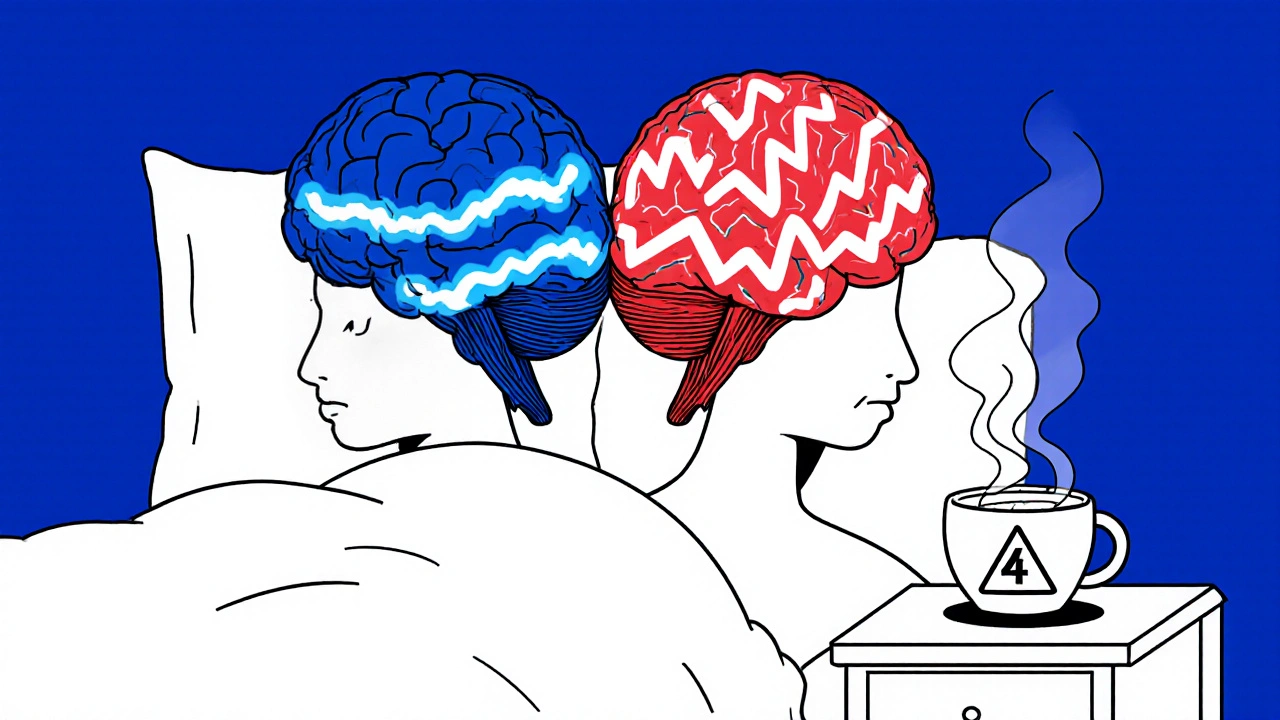
Genetics Play a Bigger Role Than You Think
Why does caffeine wreck one person’s sleep but barely affect another? It’s not willpower. It’s genes. A gene called CYP1A2 controls how fast your body breaks down caffeine. Some people have a variant that makes them “slow metabolizers.” For them, caffeine’s half-life can stretch from the average 5 hours to 12 hours or more. That means a cup of coffee at 3 p.m. could still be active in their system at 3 a.m. Clinical Pharmacology & Therapeutics published data in 2019 showing that slow metabolizers are far more likely to report insomnia, frequent nighttime awakenings, and poor sleep quality after caffeine use. If you’ve always struggled to sleep after coffee-even when you stop at 2 p.m.-you might be one of them. Testing for this is now available through companies like 23andMe, which includes caffeine metabolism results in its $199 health report. You don’t need a test to know if you’re a slow metabolizer. If you’ve tried every sleep hack and still can’t sleep after coffee, your genes might be the answer.Real People, Real Results
You don’t need to take our word for it. Look at what people are actually experiencing. On Reddit’s r/sleep, over 78% of 1,245 users who drank coffee within six hours of bedtime reported trouble falling asleep. Even more telling: 63% said their sleep quality suffered-even when they managed to fall asleep. One user, u/CaffeineStruggles, wrote in March 2023: “I switched from having my last coffee at 4 p.m. to 2 p.m. and gained almost an hour of sleep quality. Eye-opening how dramatic the difference was.” A 2022 survey by Sleepopolis tracked 2,150 people. Those who cut off caffeine by 2 p.m. (assuming a 10 p.m. bedtime) got 47 more minutes of sleep and 8% higher sleep efficiency than those who drank until 4 p.m. That’s not a small gain. That’s an extra hour of rest per night-every single night.What to Do Instead of Coffee Afternoon
You don’t have to quit caffeine. You just need to time it right. But what do you drink after your cutoff time?- Decaf coffee: Still has a tiny bit of caffeine (2-5 mg), but it’s negligible for most people. Starbucks’ “Evening Brew” launched in 2022 and now holds 15% of the after-4 p.m. coffee market.
- Herbal tea: Chamomile, peppermint, or rooibos-caffeine-free and calming.
- Half-caf: Mix regular and decaf. The AJMC review found this cuts sleep disruption by 32% compared to full-strength afternoon coffee.
- Water or sparkling water: Dehydration can mimic fatigue. Sometimes you’re not tired-you’re just thirsty.
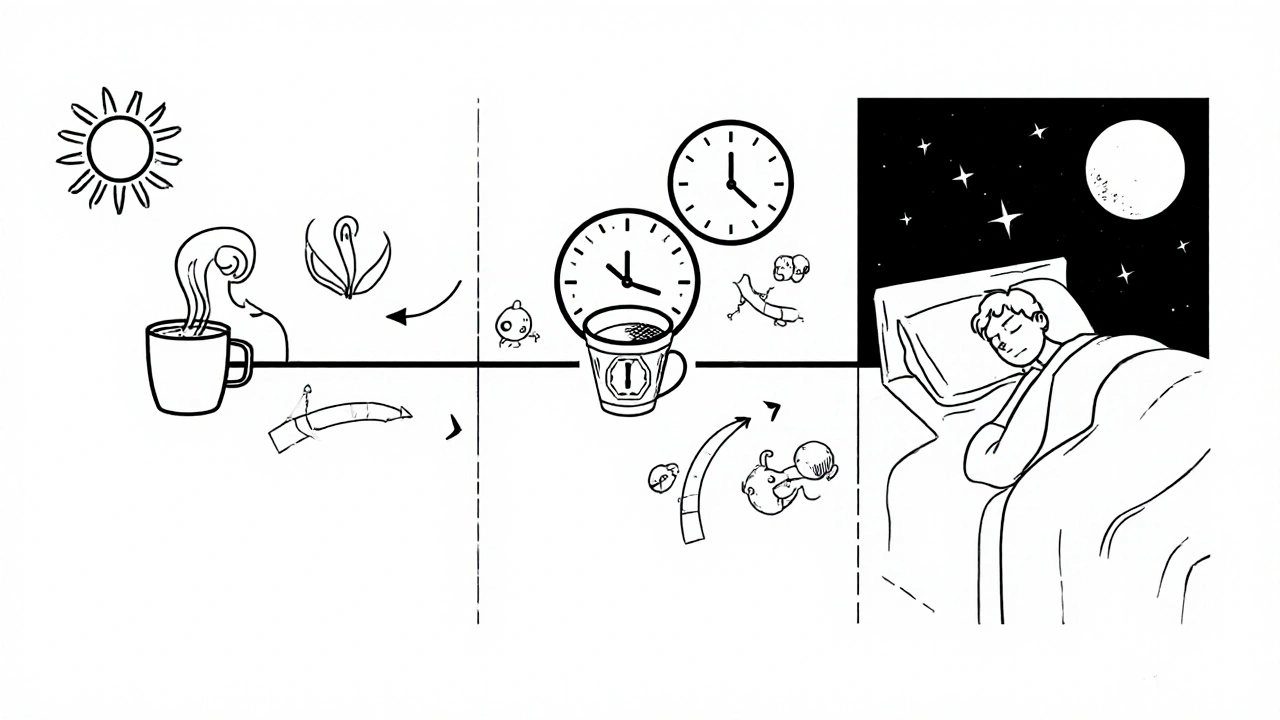
What’s Changing in 2025
The science is getting smarter. In January 2025, the American Academy of Sleep Medicine announced it’s updating its official guidelines to include beverage-specific cutoff times-no more vague “avoid caffeine late in the day.” They’re finally recognizing that a cup of coffee isn’t the same as a pre-workout shot. Wearable tech is catching up too. Oura Ring and Fitbit now offer personalized caffeine cutoff suggestions based on your sleep patterns. Oura reported a 41% increase in user engagement after adding this feature in 2021. Even smarter tools are coming. A 2024 study in Nature Communications showed machine learning models using your genetics, age, and sleep history can predict your ideal cutoff time with 89% accuracy-22% better than the standard 8-hour rule.How to Find Your Perfect Cutoff Time
Here’s how to figure out what works for you:- Start with the 8.8-hour rule. If you sleep at 11 p.m., stop caffeine at 2:12 p.m. Stick to this for 7 days.
- Track your sleep. Use a free app like Sleep Cycle or just write down when you fall asleep, how many times you wake up, and how rested you feel.
- Move it earlier. If you’re still struggling, try cutting off at 1 p.m. or even 12 p.m. for another week.
- Test caffeine-free afternoons. Try going completely caffeine-free after noon for 5 days. Notice the difference.
- Consider genetic testing. If you’ve tried everything and still can’t sleep, a 23andMe report might reveal you’re a slow metabolizer.
Final Thought: Sleep Isn’t a Luxury
You don’t need to give up coffee. But you do need to respect its power. Caffeine isn’t a harmless pick-me-up. It’s a drug with real, measurable effects on your brain and body. And if you’re not sleeping well, you’re not just tired-you’re more prone to anxiety, weight gain, poor focus, and long-term health risks. The fix is simple: stop drinking caffeine early enough for your body to clear it. For most people, that’s before 3 p.m. For others, it’s before noon. You won’t know until you try. Your best sleep isn’t a matter of willpower. It’s a matter of timing.How long before bed should I stop drinking coffee?
For a standard cup of coffee (107 mg caffeine), stop at least 8.8 hours before bedtime. If you go to sleep at 11 p.m., your last cup should be no later than 2:12 p.m. This is based on the average half-life of caffeine and confirmed by multiple sleep studies.
Is 4 p.m. too late for coffee?
For most people, yes. Even if you fall asleep after drinking coffee at 4 p.m., your sleep quality is likely reduced. Studies show caffeine consumed 6 hours before bed cuts total sleep time by 45 minutes and lowers sleep efficiency by 7%. If you’re sensitive, 4 p.m. may be too late even if you sleep fine.
Does decaf coffee affect sleep?
Decaf coffee still contains 2-5 mg of caffeine per cup-far less than regular coffee. For most people, this won’t disrupt sleep. But if you’re extremely sensitive or a slow metabolizer, even small amounts can matter. If you’re struggling, try switching to herbal tea in the afternoon.
Can caffeine affect deep sleep?
Yes. Research published in Nature Communications in 2025 found caffeine disrupts brain activity during deep, non-REM sleep more than during REM sleep. This means you might sleep, but you’re not getting the restorative, slow-wave sleep your body needs to repair tissues and consolidate memory.
Why do I sleep fine after coffee but still feel tired?
You may be falling asleep, but your sleep is fragmented and shallow. Caffeine reduces sleep efficiency and deep sleep without always preventing you from falling asleep. That’s why you feel tired even after 8 hours in bed. You’re not getting enough restorative sleep.
Are energy drinks worse for sleep than coffee?
Yes. Energy drinks often contain 80-217 mg of caffeine per serving-much more than a cup of coffee. Pre-workout supplements can contain over 200 mg, requiring a 13.2-hour cutoff. They also often include sugar and stimulants like taurine or guarana, which can worsen sleep disruption.
Can I drink tea in the afternoon without affecting sleep?
Black tea has about half the caffeine of coffee (47 mg per cup). Some people tolerate it fine in the afternoon. But there’s no official safe cutoff time because research hasn’t pinpointed one. If you’re sensitive, avoid it after 3 p.m. Green tea has even less caffeine and may be better tolerated.
Do I need to stop caffeine completely?
No. Most people can enjoy caffeine without harming their sleep-just not too late. The goal isn’t to quit coffee. It’s to time it right. Cutting off caffeine by 2-3 p.m. lets your body clear it before bed, so you get the benefits without the sleep cost.
What if I’m a slow caffeine metabolizer?
If you’re a slow metabolizer, caffeine stays in your system much longer-up to 12 hours. You may need to stop by noon or even earlier. Signs include trouble sleeping even after cutting coffee to 2 p.m., or feeling jittery hours after consumption. Genetic tests like 23andMe can confirm this.
How long does it take to see better sleep after cutting caffeine?
Most people notice improvements within 3-5 days. Sleep efficiency, time to fall asleep, and morning alertness improve quickly once caffeine is cleared from your system at the right time. For best results, stick to your cutoff for at least a week before judging the change.
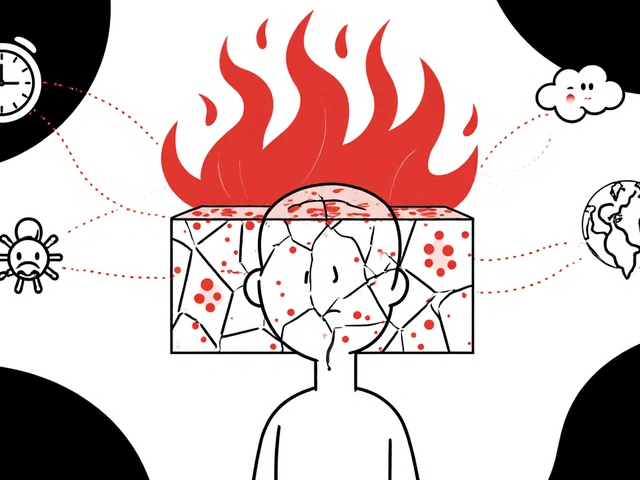

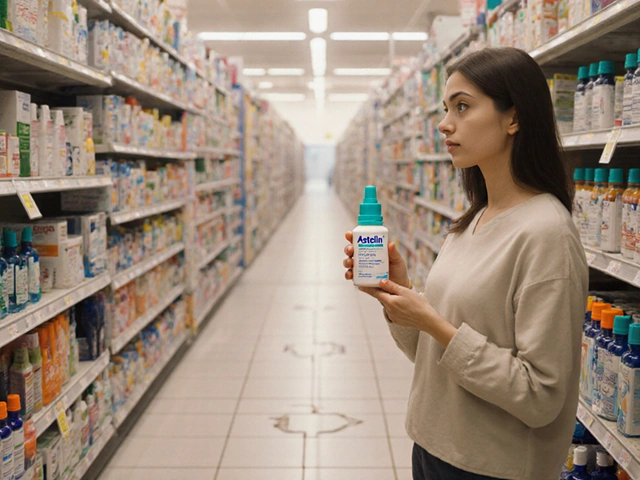
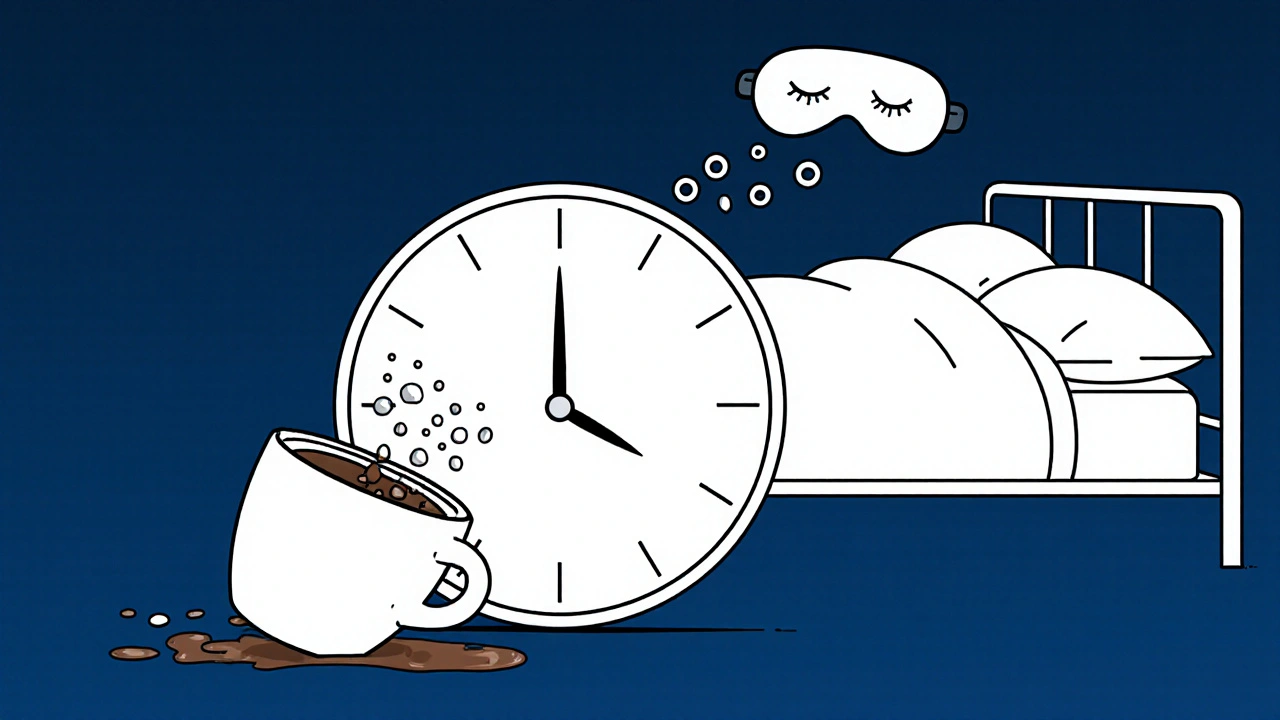
Comments
13 Comments
Jacob McConaghy
Man, I used to drink coffee at 5 p.m. and wonder why I’d wake up at 3 a.m. like a startled raccoon. Switched to 2 p.m. cutoff and my sleep went from ‘meh’ to ‘I actually remember my dreams now.’ No joke, my wife noticed I stopped snoring too. Caffeine’s not the enemy, just a bad roommate if you don’t set boundaries.
Natashia Luu
While I appreciate the empirical data presented, I must respectfully challenge the oversimplification of sleep architecture as being solely contingent upon temporal caffeine ingestion. The literature, while compelling, fails to account for circadian variance, individual metabolic polypharmacy, and the confounding variable of nocturnal cortisol dysregulation.
akhilesh jha
Interesting. In India, we drink chai all day. My grandfather drank strong masala chai at 10 p.m. and woke up at 5 a.m. sharp. Maybe it’s the spices? Or maybe we just don’t care about sleep like Americans do. But I tried stopping after 4 p.m. and I felt… weird. Like my brain was empty. Not tired. Just… gone.
Jeff Hicken
so like… i read this whole thing and now im paranoid. i had a red bull at 3:30 yesterday. am i gonna die? also why does everyone say 2pm like its bible truth? what if i work night shift? do i just not sleep at all??
Vineeta Puri
Thank you for presenting this information with such clarity and scientific rigor. It is imperative that we recognize caffeine not as a benign stimulant, but as a pharmacological agent with demonstrable impacts on neurochemical regulation. The 8.8-hour guideline is not arbitrary; it is grounded in pharmacokinetic principles that deserve widespread public education.
Victoria Stanley
I used to think I was a coffee wizard-could drink it at 6 p.m. and sleep like a baby. Turns out I was just sleep-deprived and didn’t know what real rest felt like. After switching to decaf after 2 p.m., I started waking up naturally. No alarm. Just… woke up. Felt like a new person. Also, try herbal tea. It’s not just for grandmas anymore.
Andy Louis-Charles
8.8 hours?? 😱 I just found out I’m a slow metabolizer via 23andMe. My last coffee is now at 11 a.m. No more afternoon crashes. Also, I now use Caffeine Zone and it sends me a reminder like a little digital dad. 🤖☕️
Douglas cardoza
bro i tried the 2pm rule and i just felt like i was missing out on my little afternoon ritual. now i just drink half-caf and call it a day. no regrets. also, i don’t sleep that great anyway so maybe i’m just doomed.
stephanie Hill
They don’t want you to know this, but the coffee industry is part of a global sleep suppression scheme. Big Caffeine funds sleep studies that make you think you’re fine. The real reason you’re tired? They’re draining your life force through your morning cup. I stopped everything. Now I drink warm lemon water and meditate. My aura is brighter. You’re being manipulated.
Akash Chopda
23andme is a scam. They use your dna to sell you to advertisers. Also caffeine is fine. I drink espresso at 10pm. I sleep 4 hours. I am productive. You are weak
Sam Jepsen
I’ve been telling my coworkers this for years. One guy switched to decaf after 2 and now he’s actually smiling in meetings. No joke. I bought him a mug that says ‘I stopped at 2.’ He cries every time he drinks from it. Good stuff.
Yvonne Franklin
Switched to green tea after 3. Still get a little buzz. Sleep is better. No apps needed. Just listen to your body.
Bartholemy Tuite
Look, I’m Irish, we drink tea and coffee like water. I had a cup at 7 p.m. last night and woke up at 5 a.m. feeling like I’d been hit by a bus. Then I remembered I’d also had a Red Bull at 4 p.m. and two Excedrin at 6 p.m. for a headache. So it wasn’t the coffee. It was the caffeine avalanche. I’m now on the 8.8 rule and I’ve never felt more human. Also, I spelled ‘caffeine’ wrong five times while typing this. My brain is finally resting.
Write a comment